Catholic Virtues
 |
 |
 |
 |
 |
 |
 |
True & False Paths to Happiness - X
Fulfilling Our Own Model Ideal
An elderly man becomes weaker in the physical sense of the word while, at the same time, his mind becomes more and more constricted to immediate things, preoccupied with the moment that passes, concerned about practical and concrete matters.
Several of my old acquaintances – in their 60s or so – have two exclusive concerns. One is to manage the country house where they live: the chickens and the water pump are events for them. Another is taking care of their health. In the morning they comment on how their hearts beat during the night, and they live in terror of the next trick that sickness might play on them. Seeing illness and the shadows of death as they advance in age, they defend themselves frenetically. They have no other concerns.
A younger person might think: "How is it possible to be like that after a whole lifetime? It is something frightful! I would never want this to happen to me. But... I am starting to fall into horizons and concerns that will end up like this."
The voltaic arc of innocence
If, throughout his life, a man has known how to grow not only in experience but in discernment of spirit, good sense and wisdom, his mind will acquire in old age a splendor and a nobility that will reflect on his face and be the true beauty of his last years.
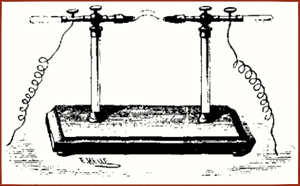
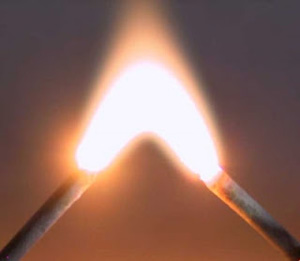 His physical body is a reminder of the death that approaches, but, in compensation, his soul has flashes of immortality.
His physical body is a reminder of the death that approaches, but, in compensation, his soul has flashes of immortality.
A man in his 50s or 60s might think: "How beautiful youth is! I have longings for my first innocence. For that candor and freshness of soul! I do not want to die without having regained the qualities of my childhood, so that when I present myself before Our Lady I can say: 'My Mother, my whole life is in your hands. Of everything that you gave me, I lost alomost nothing. You harvested fruit from all that you gave me. Still, there were some things given to me in my early days that I no longer have and need to recover.'”
When a child reaches those first dawns of reason, God shows him in some way how He wants to be seen, known and adored by that person. Most probably, when he is about to die, God will in some way manifest Himself to the person again in that primeval form, which is the way that the person is most attracted to God Our Lord.
A kind of voltaic arc is established between the moment when the person was born and the moment when he draws his last breath. And that special image of God presents itself again at the end, attracting the person and inviting him to Heaven.
Throughout life, there are moments when one remembers that first image and prepares for the last one. A man thus prepared, having taken advantage of the first image of innocence and receiving the last, can say: "Oh, my God, I adore Thee, and I adore Thee in this particular way."
Then, God harvests that soul and takes it to Heaven because it is similar to the image that He had given it with the first innocence.
Life is not a river that disembogues into the vacuum, but it flows into a sea harmonic to man and similar to him. It starts with a metaphysical dawn and ends with a metaphysical sun.
One should grow in innocence
In the Strasbourg Cathedral, every quarter of an hour one of the four automata on top of its monumental clock appears. Representing the different ages of life, the figures of a child, a young man, a man in his full strength of age and an old man each come out and parade in front of Death. One of them sounds a bell and the other turns his hourglass upside down to signify that one time has ended and another has begun.
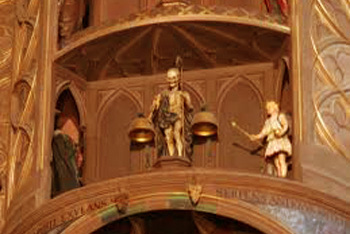
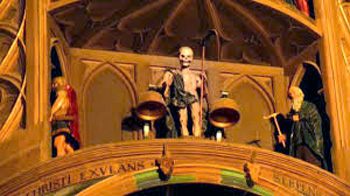 Somehow, in our life, when we pass from one age to another, a symbolic bell or gong also sounds. An hourglass is turned upside down. Something changes.
Somehow, in our life, when we pass from one age to another, a symbolic bell or gong also sounds. An hourglass is turned upside down. Something changes.
But does change mean a break with the past? Or should one think of a summation? Can an old man have something from childhood, youth, maturity and his old age?
The answer depends on the conception of each person's life. Many see the change as a gradual rupture. Others believe that there should be a summation. How can this be explained?
Childhood is generally considered to be innocent, youth is fervent and idealistic, mature age thoughtful and venal, and then old age creeps in. However, innocence is something that fits with all ages: One must grow in innocence until the time of death.
Is this view of the four ages a true one? Must it irrevocably be so?
A ‘class struggle’ between the ages
Regarding the various ages of man, there is a conception that follows the pattern of class struggle. In communist doctrine, each class is an enemy of those above it. In the "class struggle" between the ages, the person changing stages in life would lose the qualities and defects of the previous stage, and would acquire different qualities and defects.
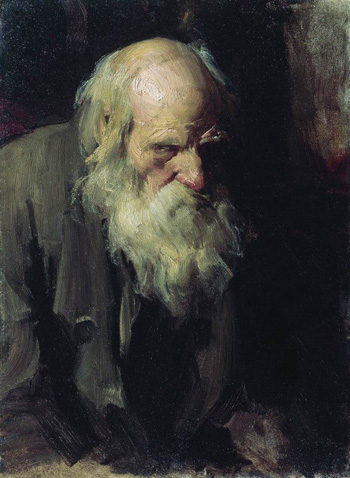 In this conception, a child dreams of the wonderful: he is weak, fragile, small, but he is pure. The pure and the marvelous are the qualities of the child.
In this conception, a child dreams of the wonderful: he is weak, fragile, small, but he is pure. The pure and the marvelous are the qualities of the child.
Then the youth comes. He is no longer pure, he dares to affirm himself practicing impurity, but he is idealistic, strong, romantic, amorous. The bad tendencies appear with the romantic and amorous characteristics.
Then maturity enters. The individual loses impulsiveness and idealism. His strength lies in stability and fixation. The reality becomes more concrete for him. He commands, he governs. He no longer has the strength of a vanguard soldier, but possesses the vigor of a general.
Afterwards comes old age. It is disenchantment. Life is worth nothing. Selfishness is everything (this is the conception we are examining). He sucks his mouth empty of teeth, tolerating his head empty of ideas, carrying his eyes empty of light and his ears empty of sound. Set in his chair, in his slippers, he compromises with death and enjoys what he can of life until death arrives.
It is the trajectory of the life of a man unfaithful to his first innocence. It is a "class struggle" of one era against another.
The sum of the ages
However, when man is faithful, the qualities of the various ages add up. He retains all the qualities of childhood until old age.
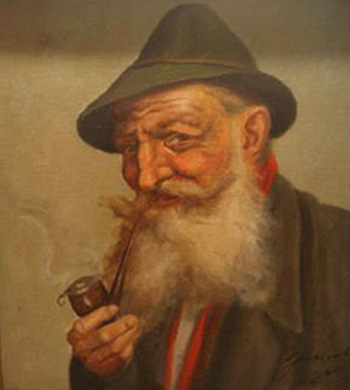 In youth, there must be those of childhood; in mature age, those of youth and childhood; in old age, a refinement, through which he possesses all the qualities of the previous ages.
When he dies, he gives his soul to God with the riches of his whole life.
In youth, there must be those of childhood; in mature age, those of youth and childhood; in old age, a refinement, through which he possesses all the qualities of the previous ages.
When he dies, he gives his soul to God with the riches of his whole life.
It is much more beautiful to exhale one's last breath like that. The man gives himself to God as one who returns the set of treasures that he received from him, begging divine mercy for what is not complete.
So must be the death of the Catholic man.
Therefore, we must assume, in the various ages, the gifts of the previous age.
This does not mean that we should not mature, but rather that we must add the perfections proper to each age. And thus reach extreme age with the innocence of childhood; the idealism of youth and all the characteristics of the previous ages.
Maria Stuart, Queen of France and later Queen of Scotland was just a girl when she made her journey from Lorraine to France. Along the way she was greeted in French and Latin by the people. A very precocious child, she answered in French or Latin. She was just seven years old!
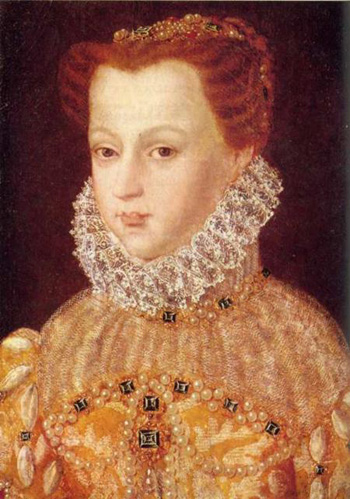 At the end of her life, when she was an old woman with white hair, there was a manifestation of youth that I consider astonishing. On the eve of being executed, knowing that she was going to die, she slept all night with such ease that, when it came time to dress for the execution, the maid had to wake her up. She approached and said:
At the end of her life, when she was an old woman with white hair, there was a manifestation of youth that I consider astonishing. On the eve of being executed, knowing that she was going to die, she slept all night with such ease that, when it came time to dress for the execution, the maid had to wake her up. She approached and said:
- Madam, the time has come."
- "What is it?"
- "Madam, the time has come."
- "I'm going."
She said her morning prayers, adorned herself and went to her death.
She showed that her psychic domain was in full force. After 18 years of imprisonment, suffering and a life of adventure – not all of them very beautiful... – she died with great dignity. It was the charm and grandeur of the House of Lorraine!
One can see that the summation of the ages gives rise to great precocities without taking away what childhood must have. These precocities have broadened their scope over time, resulting in very precocious persons, who start life early and end it late. These are the great lives of humanity.
If you have lost your first innocence, try to get it back! And so you will regain every possible happiness on this Earth.
Continued
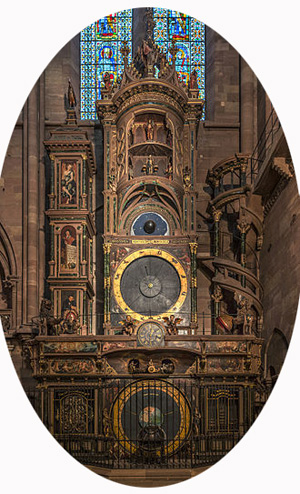

Several of my old acquaintances – in their 60s or so – have two exclusive concerns. One is to manage the country house where they live: the chickens and the water pump are events for them. Another is taking care of their health. In the morning they comment on how their hearts beat during the night, and they live in terror of the next trick that sickness might play on them. Seeing illness and the shadows of death as they advance in age, they defend themselves frenetically. They have no other concerns.
A younger person might think: "How is it possible to be like that after a whole lifetime? It is something frightful! I would never want this to happen to me. But... I am starting to fall into horizons and concerns that will end up like this."
The voltaic arc of innocence
If, throughout his life, a man has known how to grow not only in experience but in discernment of spirit, good sense and wisdom, his mind will acquire in old age a splendor and a nobility that will reflect on his face and be the true beauty of his last years.

The voltaic arc: two poles through which electricity passes producing an intense light

A man in his 50s or 60s might think: "How beautiful youth is! I have longings for my first innocence. For that candor and freshness of soul! I do not want to die without having regained the qualities of my childhood, so that when I present myself before Our Lady I can say: 'My Mother, my whole life is in your hands. Of everything that you gave me, I lost alomost nothing. You harvested fruit from all that you gave me. Still, there were some things given to me in my early days that I no longer have and need to recover.'”
When a child reaches those first dawns of reason, God shows him in some way how He wants to be seen, known and adored by that person. Most probably, when he is about to die, God will in some way manifest Himself to the person again in that primeval form, which is the way that the person is most attracted to God Our Lord.
A kind of voltaic arc is established between the moment when the person was born and the moment when he draws his last breath. And that special image of God presents itself again at the end, attracting the person and inviting him to Heaven.
Throughout life, there are moments when one remembers that first image and prepares for the last one. A man thus prepared, having taken advantage of the first image of innocence and receiving the last, can say: "Oh, my God, I adore Thee, and I adore Thee in this particular way."
Then, God harvests that soul and takes it to Heaven because it is similar to the image that He had given it with the first innocence.
Life is not a river that disembogues into the vacuum, but it flows into a sea harmonic to man and similar to him. It starts with a metaphysical dawn and ends with a metaphysical sun.
One should grow in innocence
In the Strasbourg Cathedral, every quarter of an hour one of the four automata on top of its monumental clock appears. Representing the different ages of life, the figures of a child, a young man, a man in his full strength of age and an old man each come out and parade in front of Death. One of them sounds a bell and the other turns his hourglass upside down to signify that one time has ended and another has begun.

Childhood, Adulthood & Old Age walk before Death on Strasbourg Cathedral's clock

But does change mean a break with the past? Or should one think of a summation? Can an old man have something from childhood, youth, maturity and his old age?
The answer depends on the conception of each person's life. Many see the change as a gradual rupture. Others believe that there should be a summation. How can this be explained?
Childhood is generally considered to be innocent, youth is fervent and idealistic, mature age thoughtful and venal, and then old age creeps in. However, innocence is something that fits with all ages: One must grow in innocence until the time of death.
Is this view of the four ages a true one? Must it irrevocably be so?
A ‘class struggle’ between the ages
Regarding the various ages of man, there is a conception that follows the pattern of class struggle. In communist doctrine, each class is an enemy of those above it. In the "class struggle" between the ages, the person changing stages in life would lose the qualities and defects of the previous stage, and would acquire different qualities and defects.

When one is unfaithful to his innocence, old age looks like the prelude to nothingness
Then the youth comes. He is no longer pure, he dares to affirm himself practicing impurity, but he is idealistic, strong, romantic, amorous. The bad tendencies appear with the romantic and amorous characteristics.
Then maturity enters. The individual loses impulsiveness and idealism. His strength lies in stability and fixation. The reality becomes more concrete for him. He commands, he governs. He no longer has the strength of a vanguard soldier, but possesses the vigor of a general.
Afterwards comes old age. It is disenchantment. Life is worth nothing. Selfishness is everything (this is the conception we are examining). He sucks his mouth empty of teeth, tolerating his head empty of ideas, carrying his eyes empty of light and his ears empty of sound. Set in his chair, in his slippers, he compromises with death and enjoys what he can of life until death arrives.
It is the trajectory of the life of a man unfaithful to his first innocence. It is a "class struggle" of one era against another.
The sum of the ages
However, when man is faithful, the qualities of the various ages add up. He retains all the qualities of childhood until old age.

The old man keeps the child's innocence, the youth's idealism, the adult's stability & his age's wisdom
It is much more beautiful to exhale one's last breath like that. The man gives himself to God as one who returns the set of treasures that he received from him, begging divine mercy for what is not complete.
So must be the death of the Catholic man.
Therefore, we must assume, in the various ages, the gifts of the previous age.
This does not mean that we should not mature, but rather that we must add the perfections proper to each age. And thus reach extreme age with the innocence of childhood; the idealism of youth and all the characteristics of the previous ages.
Maria Stuart, Queen of France and later Queen of Scotland was just a girl when she made her journey from Lorraine to France. Along the way she was greeted in French and Latin by the people. A very precocious child, she answered in French or Latin. She was just seven years old!

Mary Stuart, Queen of France & Scotland
- Madam, the time has come."
- "What is it?"
- "Madam, the time has come."
- "I'm going."
She said her morning prayers, adorned herself and went to her death.
She showed that her psychic domain was in full force. After 18 years of imprisonment, suffering and a life of adventure – not all of them very beautiful... – she died with great dignity. It was the charm and grandeur of the House of Lorraine!
One can see that the summation of the ages gives rise to great precocities without taking away what childhood must have. These precocities have broadened their scope over time, resulting in very precocious persons, who start life early and end it late. These are the great lives of humanity.
If you have lost your first innocence, try to get it back! And so you will regain every possible happiness on this Earth.
Continued

The grand astronomical clock in Strasbourg Cathedral

Posted May 25, 2020





